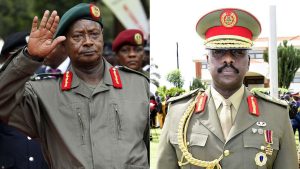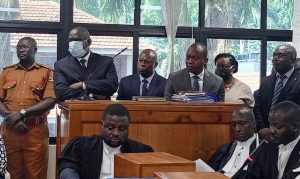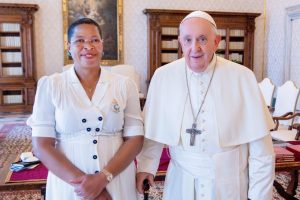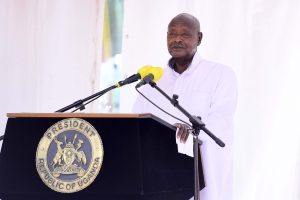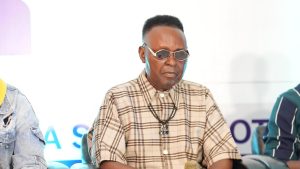
President Yoweri Kaguta Museveni has expressed gratitude for Uganda’s unity and tranquility over years.

“I’m delighted Uganda is now united and peaceful, and we can develop national institutions. You’ve seen that when we recruit for the army, we recruit across the entire country equally. There is a quota for each district,” he said.
The President delivered remarks yesterday at a Peace Day event in Yumbe District.
The event had a theme: “23 years of Peace and Progress: uniting West Nile for Socio-Economic Transformation”.
The celebrations emphasized the success of the peace deal struck on December 24, 2002, between the Government of Uganda and the Uganda National Rescue Front II (UNRF II) in the West Nile.
President Museveni stated that the National Resistance Movement (NRM) government’s policy of opposing wrongdoings and promoting justice has enabled Uganda to grow and maintain peace.
“Now because of that, this is the progress that you see. Some of the people may think we have not been able to address their problems; like the former combatants, we have taken time before addressing all their issues but this is not that we don’t want to, it is because of what must be done immediately in order to remain standing up but we shall address the issues of the ex-combatants,” the President said.
“We had to first of all maintain peace because how will you handle the issues of the combatants without peace, social services and infrastructural development?” he continued.
President Museveni stated that the National Resistance Movement (NRM) government’s strategy of opposing wrongdoing and promoting good has enabled Uganda to grow and maintain peace.
“In 1962, we did not support UPC because of the mistake they made on Buganda. They misled Buganda to go for federal which was a very complicated system and at that time, we were with Kiwanuka who although was a muganda, he advised against federal but UPC misled Buganda to go for federal which was not manageable and in no time UPC was fighting Kabaka Yekka because of that same issue,” he said.
“In 1966, we did not agree with Obote because of the way he handled that problem he created himself. We started working a bit with Obote because we were looking at the East African Federation but when Amin came to power we didn’t support him because we could see that he did not understand our vision of a United Uganda and a Federation of East Africa.”
Moreover, President Museveni stated that the NRM does not endorse a spirit of vengeance, which is why they coexist peacefully with ex-combatants and their communities.
“In 1979, although we were fighting against Amin, we were not fighting against the people of West Nile. We told our soldiers that the people of West Nile are not a problem, the mistakes are made by a few people- some leaders. When we took over power, I told the people of West Nile who had fled to Sudan to come back because the NRM was not going to target them and when they came back you saw nothing happened to them,” he said.
“Meanwhile, in Acholi and Lango, we rejected the approach of retribution. We disagreed with the targeting of Lango residents due to their association with Obote, or the targeting of Acholi residents because of Bazilio or Tito Okello. General Moses Ali’s speech then focused on the policy of fighting what is wrong and promoting what is right. We did not prosecute the Uganda People’s Congress (UPC); instead, we allowed them to use Uganda House, which had been built with government funds. When Obote’s regime collapsed, Uganda House was only at the foundation level. Amin then used government money to complete the entire structure.”
President Museveni congratulated General Salim Saleh and General Bamuze for their successful negotiation of the peace deal, which has fostered regional peace and development.
Before granting the group Shs1 billion to start, the President committed to compensating West Nile ex-combatants with Shs26 billion in phases.
Before granting the group Shs1 billion to start with, the President promised to compensate West Nile ex-combatants with Shs26 billion in phases.
He also inaugurated a monument honoring former rebel leaders who signed a peace treaty with the government 23 years ago, signaling the end of fighting and the start of peace in the West Nile region.
He inaugurated a monument honoring former rebel leaders who signed a peace treaty with the government 23 years ago, marking the end of the conflict and the start of peace in the West Nile region.
The 2nd Deputy Prime Minister, Gen. Moses Ali, informed the President that the UNRF lost 513 combatants during the struggle. He also noted that more than 60 percent of the surviving ex-combatants have since died, leaving behind orphans, widows, and dependents.
“It’s with great joy that we therefore appreciate this gesture as you launch the payment to the ex-combatants of the UNRF,” he said.
“Your Excellency, on behalf of the people of the West Nile, I would like to thank you for the strong and decisive leadership and as a result of your leadership, our country is on the right course.”
Hon. Huda Oleru, the Minister of State for Veteran Affairs, congratulated President Museveni for his strategic vision and foresight, which led to the signing of the peace deal and the pacification of the West Nile Region.
“In this regard, I wish to thank the leadership and the membership of the former UNRF led by Gen. Moses Ali for the commitment to the cause of National peace and security,” she said.
“I also thank the political leaders of West Nile for supporting and spearheading our government programs for socio-economic transformation of the region.”
Gen. Kale Kayihura, a former Inspector General of Police (IGP), who played a key role in implementing the peace agreement, expressed his gratitude to the organizing committee for recognizing him for his contributions to the West Nile peace process.
“It is very exciting to see this transformation after the peace process,” he said.
Hon. Zoe Bakoko Bakoru, the former Minister of Gender, Labor, and Social Development, expressed her gratitude to the former rebel leaders for their decision to end the conflict. She praised them for signing an agreement that outlines a path for growth, unity, and reconciliation in the West Nile Region.
“Today we are not merely remembering a date, we are reflecting on what has happened ever since. We are celebrating a triumph of spirit, we are honoring the courage it took to stop fighting and the sacrifice it took to forgive and move forward together,” she said.
She also conveyed her gratitude to President Museveni for his efforts to promote peace.
“Your steady leadership and commitment to inclusive dialogue and your willingness to listen is what paved the way for this historic peace accord signed here in Yumbe in 2002. That peace deal brought together the Uganda National Rescue Front II and the government of Uganda to sign a lasting peace agreement.”


